‘In prison because of our parents’: Children of ISIS fighters coming of age in detention ask what they’re being punished for
He had had visitors just once before, years ago when he first arrived in prison at 14. Blindfolded and led into a room by a masked guard, he said he was made to sit on a plastic chair under a cold fluorescent light and questioned by American officials.
Stefan Uterloo, now 19, told them he had an uncle in the United States but couldn’t remember where. He suspects they lost interest when they realized he wasn’t American but instead from Suriname, a small, former Dutch colony in South America.
Five years later, Uterloo still spends every day with 25 other young men in a single cell in Panorama, a maximum-security prison in northeastern Syria, where CNN interviewed him.
Built with funding from the US-led coalition against ISIS and run by the coalition’s ally, the Syrian Democratic Forces or SDF, a Kurdish-led militia, Panorama holds some of the most dangerous ISIS members captured in 2019 after the fall of the group’s so-called caliphate that, at its height, stretched across eastern Syria and western Iraq.
Also among the nearly 4,000 ISIS male detainees that the SDF says are held there are an estimated 600 boys and young men detained as boys, according to Amnesty International. Like Uterloo, many were brought to Syria, through no fault of their own, by their parents to live under ISIS rule. Now they are coming of age in prison. Many have no idea why they are being held, or what will happen to them.
“I don’t know about the big guys,” Uterloo said. “But if you’re speaking about the kids, and if you want to know the truth, we don’t even know why we are always punished. It’s like five years in this prison … We don’t even know what we’ve done. We’ve been in prison because of our parents.”
The United Nations and rights groups have long warned of the humanitarian and legal crises facing the children of ISIS fighters, who have been kept in camps and detention facilities in northeastern Syria for years. But there has been little consensus on what to do with them. Now, as the US raises the alarm that the militant group is trying to reestablish itself and launch attacks on the West, it is renewing efforts to repatriate fighters and their families to face justice at home.
According to Amnesty, the estimated 30,000 children currently held in at least 27 detention facilities and two detention camps – Al-Hol and Al-Roj – in northeastern Syria represent the highest concentration of children arbitrarily detained and deprived of their freedom anywhere in the world.
CNN was granted extremely rare access inside detention camps and facilities for suspected ISIS fighters and their family members, including Panorama prison. It was the first time the SDF had allowed journalists inside Panorama since 2021 and came just a month after Amnesty released a report accusing the SDF of holding detainees in “inhumane conditions.” The advocacy group cited detainees who said they were subjected to torture and denied access to adequate food and medical care in Panorama, leading to a severe outbreak of tuberculosis inside the prison.
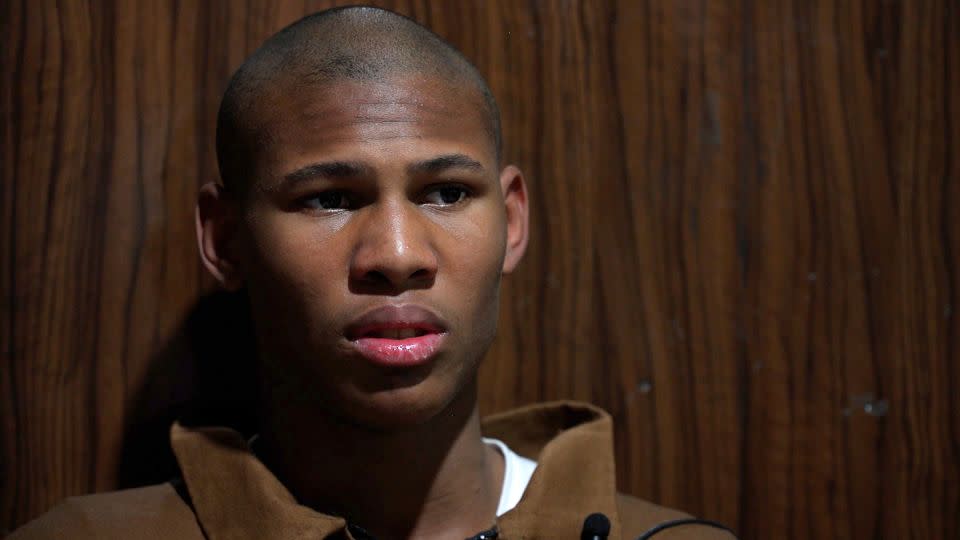
The SDF has been quick to dispute the claims of widespread and systematic abuse. Its top commander Mazloum Abdi told CNN that the group’s allegations, “are not mirroring the reality.”
“Instead of these organizations condemning what we are doing and calling it human rights violations, these organizations should give us help when it comes to our program that we have in place for years,” Mazloum said.
In the two cells that CNN was allowed to view under SDF supervision, detainees appeared to be in decent physical condition, sitting cross-legged in clean, recently built, air-conditioned spaces. But the SDF did admit that tuberculosis is rampant in the prison, accounting for five deaths per month, and coughing was audible in the hallways.
Officials told CNN that detainees spend up to 23 hours per day in their cells and are held indefinitely without charge. Advocacy groups say the circumstances amount to “a legal black hole,” even worse than the US’ Guantanamo Bay detention facility.
‘A breeding ground for the next generation of ISIS’
At Al-Hol, a sprawling detention camp of faded tents, rusted barbed wire and wind-swept earth, the scale of the problem reveals itself.
There are just over 40,000 people in the camp, where individuals with ISIS affiliations live alongside the displaced, some of them victims of ISIS themselves.
A high-security annex holds some 6,700 women and children with links to ISIS fighters from more than 60 countries, who were swept up and dumped in Al-Hol as the SDF cornered and finally defeated the group in its last stronghold, Baghouz in eastern Syria, in 2019. More than half of the camp’s population are children, the majority under 12 years old.
Beyond the legal ramifications of their arbitrary and indefinite detention, there are clear security risks as well. Gen. Erik Kurilla, head of the US military’s Central Command, said in a statement after one of his visits to Al-Hol in 2022 that the camp was “a ticking time bomb.”
“This place is a literal breeding ground for the next generation of ISIS,” he said. “These young people are vulnerable to radicalization given their very poor quality of life.”
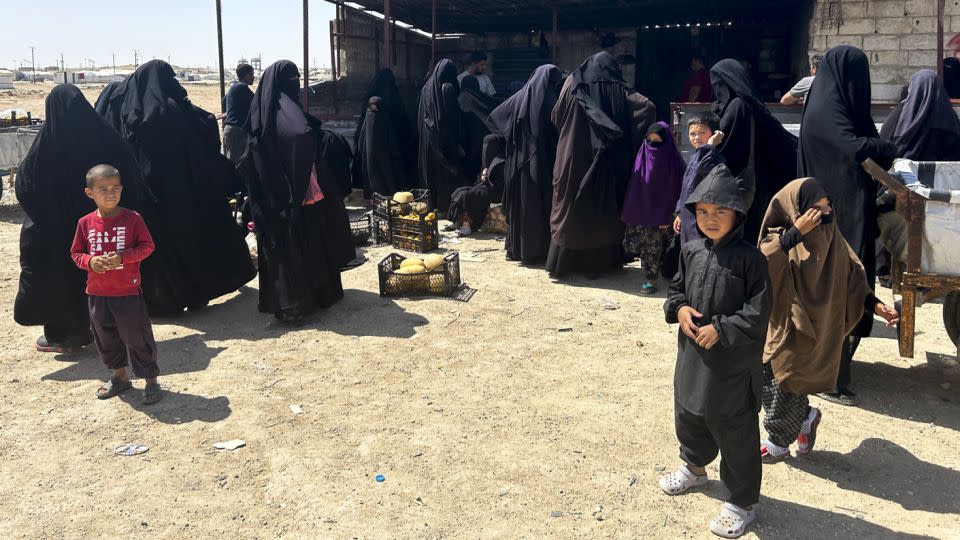
Speaking to CNN, one senior US government official put it more bluntly: “ISIS wants to keep everyone there loyal and primed.”
Every month a couple dozen 10- to 15-year-old boys are smuggled out of Al-Hol to ISIS training camps, according to the official. During periodic security raids of Al-Hol, SDF officials say they routinely find cell phone videos of the training, along with horrifying evidence of extrajudicial killings by ISIS supporters.
In one video, shared for the first time with CNN, a woman is accused of collaborating with camp administrators. She is beaten and then beheaded inside Al-Hol – the kind of brutal ISIS extrajudicial punishment that the world hoped it would never see again.
The SDF and the US have been pushing countries to repatriate citizens from Syria, telling CNN that it is the only viable solution to this complex and dangerous situation.
Al-Hol’s population has been reduced by 42% from a peak of over 73,000 in 2019, according to US officials who say the process has been too slow and many, including close allies which can more easily revoke citizenship than the US, are still dragging their feet.
“It’s unhelpful,” the senior US official told CNN.
Complicating matters, the bulk of the camp’s detainees are from countries without any allegiance to the US-led coalition, among them Russians, Chinese Uyghurs and Syrians from regime-held areas, making the prospect of permanently closing Al-Hol unrealistic, at least for now. At the current rate of repatriation, officials say it will at least take an additional seven years to halve the camp’s current population.
Taken from their mothers at night
As a stopgap, the SDF has introduced an official policy that separates boys at 14 from their mothers, placing them in two purpose-built facilities that it calls “rehabilitation” centers. CNN met children as young as 11 in one of the centers, suggesting that camp officials are going beyond that policy. One woman in Al-Hol claimed her 10-year-old son was detained for trying to escape the camp, and that boys are often taken away at age 12.
The SDF says the policy is necessary to stop boys from being radicalized by their mothers and to prevent the next generation of ISIS fighters from being born in the camps. They point to the 60 births per month recorded at Al-Hol as proof that young boys are already being married off.
But the policy is an absolute breach of international law, according to former UN Special Rapporteur on counterterrorism and human rights Fionnuala Ní Aoláin.
“It runs us into the area of a war crime,” Ní Aoláin told CNN. “There’s no legal process to justify it … you must have a court process and taking the child away from a mother is an absolute last resort, when you’ve tried everything else. And it’s neither a last resort nor a legal process, it’s generally a pretty violent, arbitrary process.”
“No one is disputing that the situation in Al-Hol is both suboptimal, dangerous, inappropriate to children, with exposure to structural and direct violence, but it’s also not taking responsibility for the very existence of those camps,” she added.
The alternative, say SDF officials, is far worse.
Compared to Al-Hol, the Orkesh “rehabilitation” center, where some boys and young men are detained, seems like a sanctuary. Its inner courtyard is dominated by a soccer field, where nearly every morning before the day’s blazing heat sets in, Shamil Chakar takes to goal.
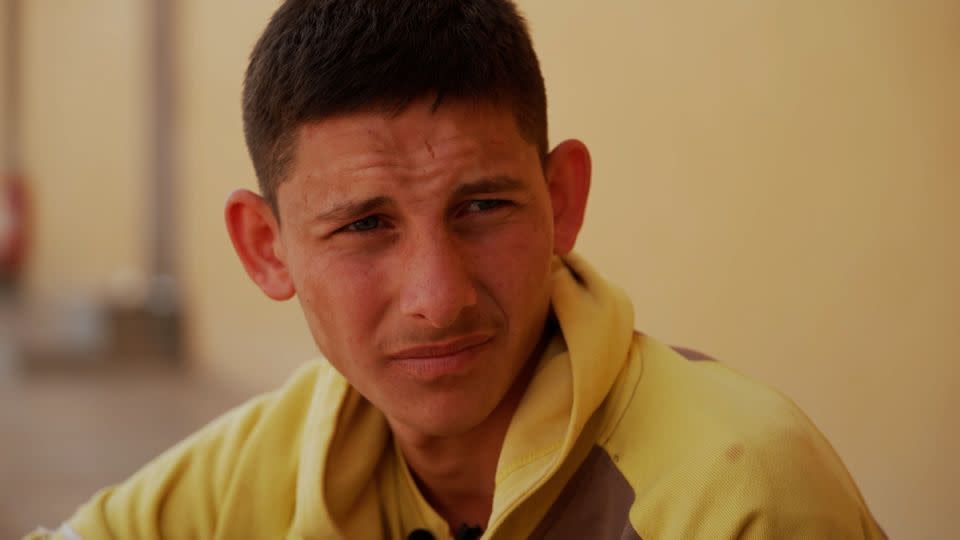
Chakar is hard to miss. The tall, lanky teenager, originally from Cologne, Germany, was taken by his parents to the former capital of ISIS’ self-declared caliphate, Raqqa.
He moves with ease on the field, but a shrapnel injury, a large scar from which is still visible on his head, has left him confused. When he sits down to talk, he doesn’t know his own age. But the memory of the night he was taken from Al-Hol by SDF security forces is fresh.
“A man came and pulled me up and tied my hand behind my back,” Shamil said. “My mom was screaming, she said ‘leave him alone.’ I didn’t want to go with them. He pushed me, saying put on your shoes, but I didn’t. Then he hit me.”
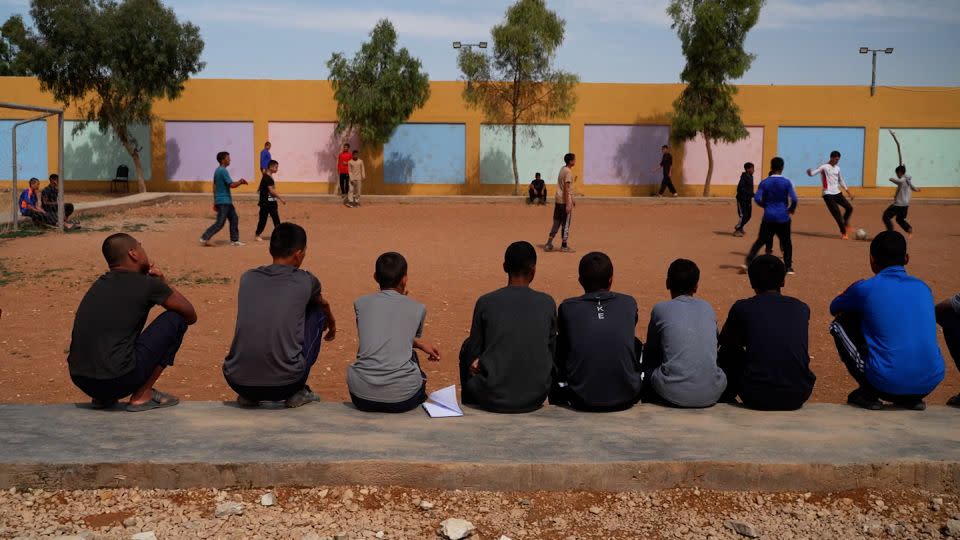
Other boys have similar stories of violent separation. All miss their mothers. But their lives have also changed dramatically. At the center, they have rooms with beds, three meals per day and psychological support five days a week.
‘I would choose an American prison any day’
Second chances are nearly impossible to come by. For those in detention, repentance is demanded, and forgiveness rarely given. But when it does happen, it’s at Al-Roj camp.
It is much smaller and more manageable than Al-Hol, and it is where international detainees are transferred before repatriation.
In early May, 50-year-old American Brandy Salman and her nine children, aged 7 to 26, along with two young sons of a Minnesota man, left Al-Roj in what was one of the largest repatriations back to the US to date.
Roughly a dozen Americans remain in Al-Roj, according to US officials, who are seeking to bring them back.
But for now, Hoda Muthana, an American-born woman, isn’t one of them. She has been stuck in Al-Roj for more than five years with her now 7-year-old son. She’s well-known in the camp for being outspoken. She doesn’t wear a face veil and scrawled F-ISIS on the wall outside her tent.
Raised in Alabama, she left her family at the age of 20 to live under ISIS after having been drawn in by the group’s propaganda on social media. She became a noted ISIS propagandist herself, cheering their attacks in posts on Twitter, now X, and calling on others to join the self-declared caliphate. Muthana denies personally posting the tweets, telling CNN her phone was taken when she joined ISIS, a decision she deeply regrets.
As her son grows older, nearing the age of the forced separation policy, she lives in constant fear for his future.
Her American lawyers are continuing to push for her repatriation and that of her son, after the Trump administration revoked her passport on a technicality in 2019 and said that she was not a citizen.
Left with few remaining options after the Supreme Court refused to hear her appeal, her legal team has directly petitioned the State Department for a certificate of identity to prove her status.
A State Department spokesperson told CNN it had not changed its position regarding Muthana’s citizenship status. “Hoda Muthana is not a US citizen. As the State Department determined and the courts agreed, she is not and never was a US citizen. For privacy reasons, we are unable to provide further comment,” the spokesperson said.
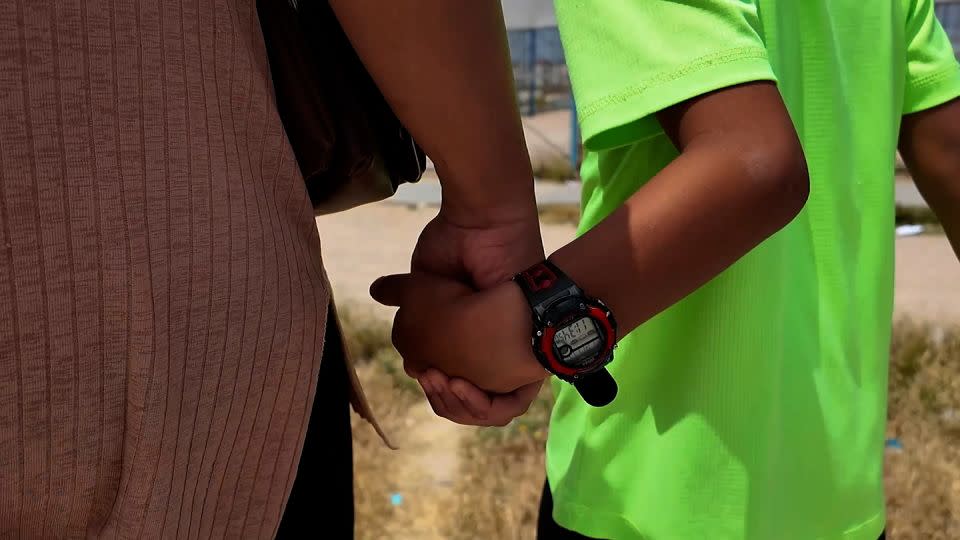
Muthana’s lawyer Christina Jump told CNN the department’s stance is hypocritical at best and dishonest at worst.
“The US has taken a high and mighty approach in lecturing other countries that they need to repatriate. If Hoda Muthana is not a US citizen, then she is stateless and that is a violation of international law and that directly contradicts what the US government has stated that other countries cannot and should not do,” Jump said. “They also are ignoring completely that at the very least there is a grandchild of US citizens who remains in that camp that they have known about for years now.”
Inside a tent surrounded by her son’s toys and books, Muthana told CNN that all she wanted was to go home to the US, even if it meant being in prison.
“If I had any time to serve, I would serve it and I would come out and begin my life with my son,” she said. “If I were to have the choice between American prison and this camp, I would choose an American prison any day.”
Credits
Video journalist: Scott McWhinnie
Video editors: Oscar Featherstone and Augusta Anthony
Graphics editor: Lou Robinson
Photo editor: Sarah Tilotta
Editors: Eliza Mackintosh and Laura Smith-Spark
For more CNN news and newsletters create an account at CNN.com


